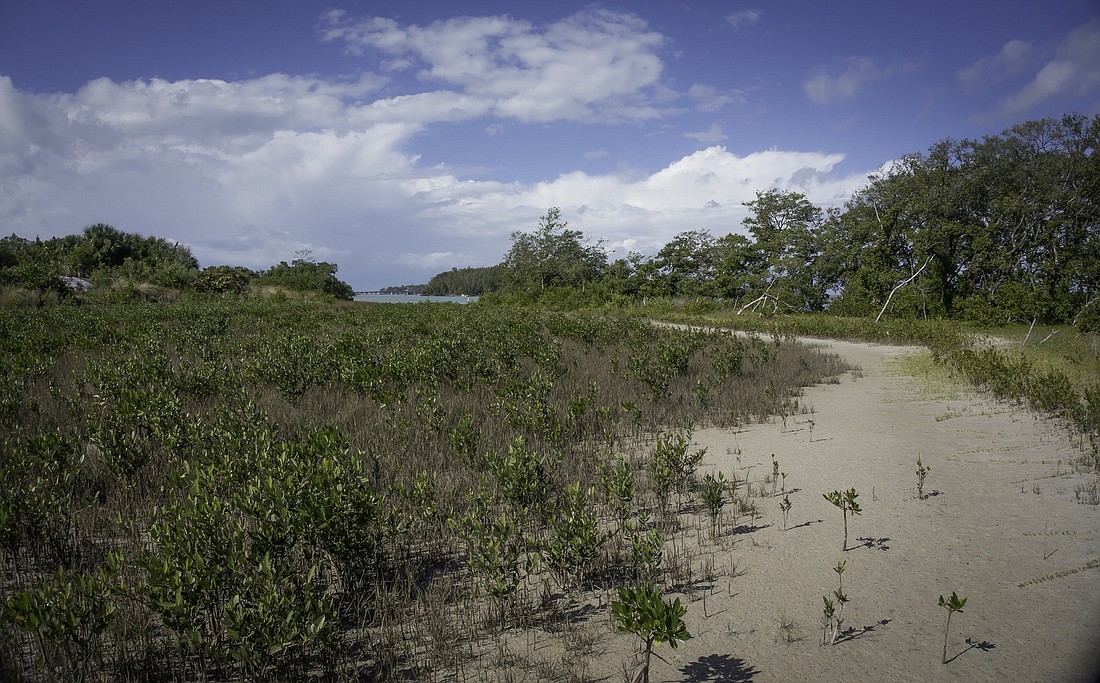- November 28, 2024
-
-
Loading

Loading

Today, Sister Keys are home to native vegetation that provides a rich habitat for a variety of wildlife, including fiddler crabs, ibis, gopher tortoises and roseate spoonbills. They’re the largest set of undeveloped islands from Tampa Bay to Charlotte Harbor.
Rusty Chinnis doesn’t know what the four mangrove islands would look like today if the town hadn’t purchased them in 1992. But he is pretty sure it would hold at least a few houses, and possibly resemble Jewfish Key.
In the past, people went to the undeveloped islands to camp or fish.
In the late 1960s, developers sought to build the Shangri Isle Club on the mangrove islands — complete with a marina, golf course and 5,000-foot lighted landing strip for airplanes — but the town rejected plans former owner H.H. Ambler submitted in 1968.
Local businessman Herb Field and a group of European investors purchased the islands in 1969, and they remained undeveloped.
But, in 1989, an advertisement in the Longboat Observer touted the possibilities for the islands:
“A unique site for a unique person: an island in the Intracoastal all to yourself,” the ad stated. “A riot of tropical flora, including mangroves, sea grapes and cabbage palms have grown here undisturbed since the keys were born.”
It listed the price for the four islands at $1.5 million.
“It is possible to build on 73 acres of this island,” it read.
The ad mobilized residents Chinnis, Anna Miller and Virginia Sanders to form the Sister Keys Conservancy to preserve the islands as a natural resource.
The Shangri Isle development was no longer a possibility because of updated environmental regulations, but zoning restrictions allowed for eight homes on approximately 23 upland acres.
In the early days, the group raised money to purchase the islands by holding “Music in the Park”
fundraisers, bake sales and calling anyone members could think of who would support the effort.
The group raised approximately $50,000 toward the purchase. But, eventually, members found a new possibility for preserving the islands.
The town needed additional open space for its Comprehensive Plan, so the group lobbied officials to purchase the islands. In July 1992, the commission agreed to purchase Sister Keys for $975,000, using $717,000 from the town’s land-acquisition fund, $212,000 of infrastructure surtax funds and $46,000 from the Sister Keys Conservancy.
Since then, the islands have been restored to what they most likely looked like 100 years ago, thanks to a $1.2 million mitigation project the town completed in 2008 that involved removing non-native, invasive vegetation such as Australian pines and Brazilian peppers and replacing them with native plants. The native flora makes the islands a better habitat for a variety of wildlife, and surrounding seagrasses also provide habitat for manatees, scallops, crabs and oysters.
Although the islands are not accessible to the public because they make up an environmental preserve, the public will have the opportunity to visit the islands by volunteering in the sixth annual Sarasota Bay Watch Sister Keys Cleanup May 17 (see sidebar). The organization adopted the mangrove islands through an agreement with the town in 2010 and has held yearly cleanups since 2009.
Although the Sister Keys Conservancy’s efforts are preserved through the wildlife and plant life that flourishes on the islands, recently its efforts received formal recognition. A sign at the town dock in the Longbeach Village, funded by a grant from the Longboat Key Garden Club, was erected earlier this year.
Sister Keys Cleanup
What: Help remove trash and debris from the mangrove wetland preserve. Volunteers should bring sunscreen, insect repellent, a hat, gloves, glasses and water shoes. Kayaks and boats are welcome; those who don’t have a boat can sign on as crew members.
Volunteers will receive a complimentary lunch after the cleanup at Mar Vista.
When: Sign-up begins at 8 a.m.; cleanup is from 9 to 11:30 a.m. Saturday, May 17
Where: Begins at Mar Vista Dockside Restaurant & Pub, 760 Broadway
Register: Visit sarasotabaywatch.org